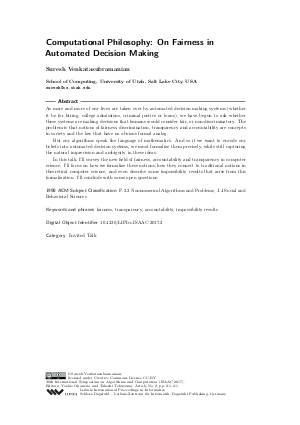Computational Philosophy: On Fairness in Automated Decision Making
Author Suresh Venkatasubramanian
-
Part of:
Volume:
28th International Symposium on Algorithms and Computation (ISAAC 2017)
Part of: Series: Leibniz International Proceedings in Informatics (LIPIcs)
Part of: Conference: International Symposium on Algorithms and Computation (ISAAC) - License:
 Creative Commons Attribution 3.0 Unported license
Creative Commons Attribution 3.0 Unported license
- Publication Date: 2017-12-07
File

PDF
LIPIcs.ISAAC.2017.2.pdf
- Filesize: 200 kB
- 1 pages
Document Identifiers
Subject Classification
Keywords
- fairness
- transparency
- accountability
- impossibility results
Metrics
- Access Statistics
-
Total Accesses (updated on a weekly basis)
0PDF Downloads0Metadata Views
Abstract
As more and more of our lives are taken over by automated decision making systems (whether it be for hiring, college admissions, criminal justice or loans), we have begun to ask whether these systems are making decisions that humans would consider fair, or non-discriminatory. The problem is that notions of fairness, discrimination, transparency and accountability are concepts in society and the law that have no obvious formal analog. But our algorithms speak the language of mathematics. And so if we want to encode our beliefs into automated decision systems, we must formalize them precisely, while still capturing the natural imprecision and ambiguity in these ideas. In this talk, I'll survey the new field of fairness, accountability and transparency in computer science. I'll focus on how we formalize these notions, how they connect to traditional notions in theoretical computer science, and even describe some impossibility results that arise from this formalization. I'll conclude with some open questions.
Cite As Get BibTex
Suresh Venkatasubramanian. Computational Philosophy: On Fairness in Automated Decision Making. In 28th International Symposium on Algorithms and Computation (ISAAC 2017). Leibniz International Proceedings in Informatics (LIPIcs), Volume 92, p. 2:1, Schloss Dagstuhl – Leibniz-Zentrum für Informatik (2017)
https://doi.org/10.4230/LIPIcs.ISAAC.2017.2
BibTex
@InProceedings{venkatasubramanian:LIPIcs.ISAAC.2017.2,
author = {Venkatasubramanian, Suresh},
title = {{Computational Philosophy: On Fairness in Automated Decision Making}},
booktitle = {28th International Symposium on Algorithms and Computation (ISAAC 2017)},
pages = {2:1--2:1},
series = {Leibniz International Proceedings in Informatics (LIPIcs)},
ISBN = {978-3-95977-054-5},
ISSN = {1868-8969},
year = {2017},
volume = {92},
editor = {Okamoto, Yoshio and Tokuyama, Takeshi},
publisher = {Schloss Dagstuhl -- Leibniz-Zentrum f{\"u}r Informatik},
address = {Dagstuhl, Germany},
URL = {https://drops.dagstuhl.de/entities/document/10.4230/LIPIcs.ISAAC.2017.2},
URN = {urn:nbn:de:0030-drops-82747},
doi = {10.4230/LIPIcs.ISAAC.2017.2},
annote = {Keywords: fairness, transparency, accountability, impossibility results}
}
